|
|
|
Sort Order |
|
|
|
Items / Page
|
|
|
|
|
|
|
| Srl | Item |
| 1 |
ID:
171680
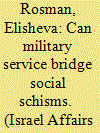

|
|
|
|
|
| Summary/Abstract |
Can the military bridge social schisms? Conventional wisdom supports this assumption. However, it seems that, at best, the effect of military service on bridging social schisms and promoting social cohesion is limited. This article examines the extended effect of contact hypothesis in the military, both in practice and as an element capable of bringing about a change in veterans’ thinking. It asks: are veterans who had diverse friendships during their service more likely to have diverse friendships in the future? If so, do they attribute their ability and willingness to include others within their ingroup to their military service? Based on findings from a study of Israeli college and university students, the article demonstrates that while indeed service friendships may be short lived, service alongside members of outgroups has certain longer-term effects and influences the social perception of veterans. Social messages can be both positive and negative and teach veterans the limits of redrawing social boundaries.
|
|
|
|
|
|
|
|
|
|
|
|
|
|
|
|
| 2 |
ID:
171676
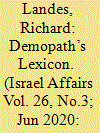

|
|
|
|
|
| Summary/Abstract |
This article examines a double discourse by the Palestinian leadership, one in English and one in Arabic, which plays a central role in their negotiating strategy with Israel since the onset of the Oslo ‘peace process’ (1993). Using language very close to Western terminology, Palestinians in English speak of ‘Occupation’ and ‘Settlements’ with the 1967 borders as the defining issue; while in Arabic, they speak of ‘Occupation’ and ‘Settlements’ in terms of the 1948 borders (i.e., all of Israel is an ‘Occupation’ and Tel Aviv is an illegal ‘settlement’). As a zero-sum negotiating strategy this makes perfect sense: convince Israel to concede ‘land for peace’ (1967 borders), when in reality this means ‘land for war’ (1967 borders as launching pad for war to 1948 borders). The western news media, allegedly committed to accurate reporting, shows no knowledge of the Arabic discourse and presents what Palestinians say in English as reliable reflections of their actions and intentions. As a result of this failure to identify the double-discourse, the Western legacy media presents Palestinian war propaganda as news to their Western audiences, unwittingly helping the Palestinians in their deception.
|
|
|
|
|
|
|
|
|
|
|
|
|
|
|
|
| 3 |
ID:
171674
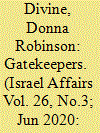

|
|
|
|
|
| Summary/Abstract |
The Gatekeepers” describes the reaction of a handful of well established Israel Studies scholars to a special issue of the journal Israel Studies called “Word Crimes: Reclaining the Language of the Israeli-Palestinian Conflict”. These professors preferred to denounce rather than engage with the arguments and analyses presented in the special issue deploying their authority to try to silence this challenge to the conventional discourse on the Middle East Conflict.
|
|
|
|
|
|
|
|
|
|
|
|
|
|
|
|
| 4 |
ID:
171688
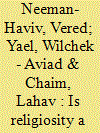

|
|
|
|
|
| Summary/Abstract |
This article seeks to examine the connection between religiosity and deviance, focusing on the phenomenon of risk behaviour among Jewish national-religious youth at-risk. The study was conducted by using interviews with 66 participants in six focus groups among teenagers and young people at-risk, normative youth and professionals. Analysis of the research findings revealed several main themes that touch upon the issue of religion as both a protecting and a risk factor for religious youths, beginning with the question of personal identity, and continue with the influence of social control and social labelling.
|
|
|
|
|
|
|
|
|
|
|
|
|
|
|
|
| 5 |
ID:
171695
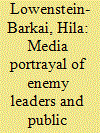

|
|
|
|
|
| Summary/Abstract |
Despite the growing number of studies analysing the role of media in peace processes, there is almost no literature on the relationship between media and public opinion during peace processes. This article examines this question using the case study of the Oslo Accords. Specifically, it analyzes the compatibility between media portrayals of Yasser Arafat and Yitzhak Rabin and Israeli and Palestinian public support for peace negotiations. The findings indicate that (a) the enemy’s binary image may change positively following the signing of peace agreements; and (b) this change may accelerate emerging peace processes.
|
|
|
|
|
|
|
|
|
|
|
|
|
|
|
|
| 6 |
ID:
171683
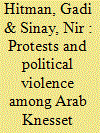

|
|
|
|
|
| Summary/Abstract |
This article seeks to understand the extent of Arab MKs’ involvement in protests and political violence over the past decade. By way of doing so, it will examine this phenomenon in four case studies: Mavi Marmara Flotilla (2010), Operation Pillar of cloud (2012), Operation Protective Edge (2014), and the passing of Israel’s Nation-State law in 2018. The findings reveal that, unlike many other protests in the Arab world, Arab Israeli protest in the examined case studies were neither based on economic inequality nor related to civil society issues but were rather a corollary of nationalist radicalisation. A dangerous trend of anti-Semitism was also detected among Israel’s Arab leaders.
|
|
|
|
|
|
|
|
|
|
|
|
|
|
|
|
| 7 |
ID:
171690


|
|
|
|
|
| Summary/Abstract |
The demographic processes that have been avolving in recent years around the world and Israeli society in particular, associated with the rise in life expectancy and the aging of population, are rasing the depedency ratio and increasingpublic policy makers' interest in issues related to caring for the elderly and thier support. These circumstances have a considerable effect on family member required to assist thier aging parents, as they raise the potential support ratio and have an even greater impact on employed family caregivers. This article examined the policy implemented in Israel for providing support and assistance to employed family caregivers assisting ageing parents. It shows that the current policy is relatively limited compared to that of other liberal countries and not compatible with caregivers’ demands and needs. The article calls for implementing an effective public policy for employed family caregivers and suggests ways of formulating such a policy.
|
|
|
|
|
|
|
|
|
|
|
|
|
|
|
|
| 8 |
ID:
171699


|
|
|
|
|
| Summary/Abstract |
Indo-Israeli relations have gained tremendous momentum under Prime Minister Narendra Modi. While the PM’s deliberate and cohesive efforts deserve credit, other significant contributing factors must not be overlooked. Moving away from the dominant Modi-centric approach, this article explores significant contributing factors in the new phase in India-Israel relations under Modi. It concludes that more than a single factor, it is a combination of conditions and factors that actively and collectively brought about the change.
|
|
|
|
|
|
|
|
|
|
|
|
|
|
|
|
| 9 |
ID:
171686


|
|
|
|
|
| Summary/Abstract |
What drives a person to take part in a collective action and engage in political protest? This is a question that has long interested social scientists. Recent theoretical and empirical research in industrialised countries that centres on the political behaviour of individuals examines five main factors – grievances, efficacy, identity, emotions and social embeddedness – to understand what leads citizens to join social protests. Drawing on such research and using Israel National Election Studies (INES) data, this article examines the political attitudes of participants in the widespread ‘Social Justice’ protests that took place in Israel in 2011, with the aim of explaining what motivates civic participation in such protests. By analysing the profile of the demonstrators, our findings provide additional empirical evidence to the theoretical approach and assist in understanding political protest behaviour in general.
|
|
|
|
|
|
|
|
|
|
|
|
|
|
|
|
| 10 |
ID:
171675
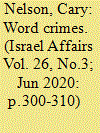

|
|
|
|
|
| Summary/Abstract |
With some distance from the first flood of responses to the Word Crimes special issue, it should be possible to combine debates over the strengths and weaknesses of the individual essays with analysis of what difference the collection as a whole can make in our understanding of the anti-Zionist vocabulary that has dominated a significant body of humanities and social science discourse. In actual practice, terms like ‘apartheid,’ ‘human rights,’ and ‘genocide’ intersect and interact to amplify their effect. That tends to crowd out alternative meanings. The importance of the insight, if anything, makes the fundamental irrationality and unprofessionalism of the attacks on the special issue even more stark and apparent.
|
|
|
|
|
|
|
|
|
|
|
|
|
|
|
|
| 11 |
ID:
171677
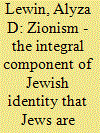

|
|
|
|
|
| Summary/Abstract |
The yearning and determination of Jews to re-establish their Jewish homeland in the Land of Israel is “Zionism” – an integral component of Jewish identity. It is more than the political movement launched in the 1800’s. The deep religious, ancestral, and ethnic connection of Jews to the Land of Israel is as old as Abraham and the Bible. Jewish messianic movements brought Jews to Israel between the 13th and 19th centuries, proving the Jews’ historic sense of peoplehood and their belief in the “ingathering of the exiles.” Only in the 18th century did Jews first shed this element of Jewish identity because European governments demanded this surrender in exchange for citizenship. Why are Jews demonised and marginalised today when they express support for Israel? It is a modern manifestation of the antisemitic pressure on Jews to shed the national and ethnic part of their Jewish identity. Discrimination against anyone who observes the Jewish Sabbath, wears a kippah, or maintains a kosher diet is universally recognised as antisemitism. It is equally antisemitic to marginalise or harass Jews for expressing the Zionist component of their Jewish identity. Isolating and dehumanising Zionists is akin to branding Jews with a virtual “yellow Star of David.” To ensure that history does not repeat itself, we must forcefully condemn this modern mode of antisemitism.
|
|
|
|
|
|
|
|
|
|
|
|
|
|
|
|
|
|
|
|
|